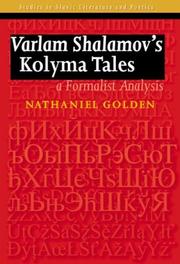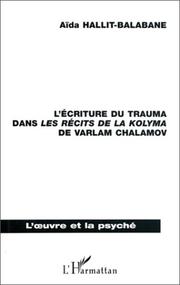| Listing 1 - 10 of 11 | << page >> |
Sort by
|
Book
ISBN: 9785976509269 5976509266 9785020372467 5020372463 Year: 2010 Publisher: Moskva : Flinta : Nauka,
Abstract | Keywords | Export | Availability | Bookmark
 Loading...
Loading...Choose an application
- Reference Manager
- EndNote
- RefWorks (Direct export to RefWorks)
Book
Abstract | Keywords | Export | Availability | Bookmark
 Loading...
Loading...Choose an application
- Reference Manager
- EndNote
- RefWorks (Direct export to RefWorks)
Book
ISBN: 9782378560720 2378560729 Year: 2022 Publisher: Lagrasse : Verdier,
Abstract | Keywords | Export | Availability | Bookmark
 Loading...
Loading...Choose an application
- Reference Manager
- EndNote
- RefWorks (Direct export to RefWorks)
Book
ISBN: 9782322031894 Year: 2013 Publisher: Paris : Books on demand,
Abstract | Keywords | Export | Availability | Bookmark
 Loading...
Loading...Choose an application
- Reference Manager
- EndNote
- RefWorks (Direct export to RefWorks)

ISBN: 9789004484061 9789042011984 Year: 2004 Publisher: Leiden; Boston : BRILL
Abstract | Keywords | Export | Availability | Bookmark
 Loading...
Loading...Choose an application
- Reference Manager
- EndNote
- RefWorks (Direct export to RefWorks)
This book analyses eleven of Varlam Shalamov's Kolyma Tales from a neo-Formalist perspective. The tales are a testament to Shalamov's seventeen years in Stalin's Gulags, and were written in an attempt to draw attention to this period in Soviet history. Nathaniel Golden has primarily utilised L. M. O'Toole's work Structure, Style and Interpretation in the Russian Short Story as the major basis for analysis, but has incorporated many other Formalist and indeed Structuralist methods. The tales in each chapter are analysed by means of five major Formalist categories: Narrative Structure, Point of View, Fabula and Sujet, Characterisation and Setting. This process highlights many of Shalamov's ideas and motifs in the tales. He frequently uses techniques of estrangement and paradox to augment camp experience, reflecting his belief that there is no moral, emotional or spiritual gain in suffering. He habitually employs a 'focaliser' to tell the tale from a near-death perspective and in consequence distances the author from events. His literary background is prominent within the tales, where he occasionally alludes to earlier Russian authors and their works to indicate the recurring nature of Man's fallibility against the Gulag background. His characters are often simply portrayed yet representative of flawed heroes and the baseness of human beings subjected to an existence in extremis. His settings are minimal, yet form a major part of his message: Man is compared to nature, but nature is powerful and able to regenerate itself, whereas Man's existence is temporary and futile. This book therefore, shows that the Formalist approach is indeed still valid as a literary tool of analysis as well as showing that upon the 50th year of Stalin's death, Varlam Shalamov's time has arrived.
Book
ISBN: 2070723925 Year: 1991 Volume: 20 Publisher: Paris NRF-Gallimard
Abstract | Keywords | Export | Availability | Bookmark
 Loading...
Loading...Choose an application
- Reference Manager
- EndNote
- RefWorks (Direct export to RefWorks)
Pasternak, Boris Leonidovich, --- Shalamov, Varlam --- Correspondence --- Pasternak, Boris Leonidovich --- Chalamov, Varlan --- Correspondence.

ISBN: 2738478417 Year: 1999 Volume: *43 Publisher: Paris Montréal L'Harmattan
Abstract | Keywords | Export | Availability | Bookmark
 Loading...
Loading...Choose an application
- Reference Manager
- EndNote
- RefWorks (Direct export to RefWorks)
Psychic trauma in literature
---
#BIBC:ruil
Book
ISBN: 9789004468481 9789004468450 Year: 2021 Publisher: Leiden; Boston : BRILL
Abstract | Keywords | Export | Availability | Bookmark
 Loading...
Loading...Choose an application
- Reference Manager
- EndNote
- RefWorks (Direct export to RefWorks)
Alexander Solzhenitsyn and Varlam Shalamov are two of the best-known Gulag writers. After a short period of personal acquaintance, their lives and views on literature took different paths. Solzhenitsyn did not see a literary program in Shalamov's works, which he describes as "a result of exhaustion after years of hard labour in the camp". By understanding the text as a "result", Solzhenitsyn critically touched on a concept of evidence, which Shalamov several times emphasized as important to his own works. According to Shalamov, instead of the text being a re-presentation, it should be an extract from or substitute for the real or the factual, by which his Gulag experience became present once again. Concepts such as "document", "thing" and "fact" became important for Shalamov's self-identification as a modernist. At the same time, Solzhenitsyn, viewing his own task as one of restoring historical experiences of the Russian people and trying "to explain the slow course of history and what sort of one it has been", assumed the dual role of writer and historian, which inevitably raises the question of what characterizes the borders between fact and fiction in his works. It also raises question about dichotomies of historical and fictional truth. Contributors: Andrea Gullotta, Fabian Heffermehl, Luba Jurgenson, Irina Karlsohn, Josefina Lundblad-Janjić, Elena Mikhailik, Michael A. Nicholson, Irina Sandomirskaja, Ulrich Schmid, Franziska Thun-Hohenstein, Leona Toker.
Book
ISBN: 9780814211229 Year: 2010 Publisher: Columbus Ohio State university press
Abstract | Keywords | Export | Availability | Bookmark
 Loading...
Loading...Choose an application
- Reference Manager
- EndNote
- RefWorks (Direct export to RefWorks)
Ethics in literature --- Literary form --- Literature --- Aesthetics --- Austen, Jane, 1775-1817 --- Conrad, Joseph, --- Dickens, Charles --- Eliot, George, --- Fielding, Henry --- Hardy, Thomas, --- Hawthorne, Nathaniel, --- Joyce, James --- Kafka, Franz --- Shalamov, Varlam Tikhonovich --- Sterne, Laurence --- Criticism and interpretation.
Book
ISBN: 2864323524 9782864323525 Year: 2005 Publisher: Lagrasse: Verdier,
Abstract | Keywords | Export | Availability | Bookmark
 Loading...
Loading...Choose an application
- Reference Manager
- EndNote
- RefWorks (Direct export to RefWorks)
Concentration camps --- Political prisoners --- Camps de concentration --- Prisonniers politiques --- Fiction --- Biography --- Romans, nouvelles, etc. --- Biographie --- Kolyma (Concentration camp) --- Soviet Union --- URSS --- Social life and customs --- Moeurs et coutumes --- Récits personnels. --- Chalamov, Varlam Tikhonovitch --- Biographies. --- Šalamov, Varlam Tihonovič --- Shalamov, Varlam. --- Fiction. --- Internment camps --- Šalamov, Varlam Tihonovič
| Listing 1 - 10 of 11 | << page >> |
Sort by
|

 Search
Search Feedback
Feedback About UniCat
About UniCat  Help
Help News
News